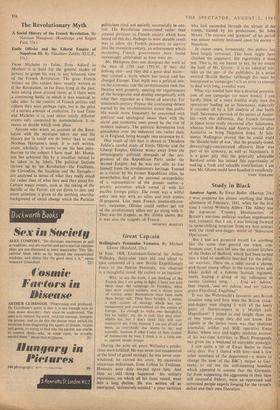Great Captain
IN June, 1808, Lieutenant-General Sir Arthur Wellesley, thirty-nine years old, and about to take command of a new British Expeditionary Force to the Iberian Peninsula, was observed in a thoughtful mood. He replied to an inquirer:
Why, to say the truth. I am thinking of the French that I am going to fight. I have not seen them since the campaign in Flanders, when they were capital soldiers, and a dozen years of victory under Buonoparte must have made them better still. They have besides, it seems, a new system of strategy which has out- manoeuvred and overwhelmed all the armies of Europe. 'Tis enough to make one thoughtful; but no matter; my die is cast, they may over- whelm me, but I don't think they will out- manoeuvre me. First, because I am not afraid of them, as everybody else seems to be; and secondly, because if what I hear of their system of manoeuvres be true, I think it is a false one as against steady troops.
During the next six years Wellesley's predic- tions were fulfilled. He was never out-manceuvred at the level of grand strategy; he was never over- whelmed; he carried his army, by successive victorious milestones, from Lisbon to Toulouse. Honours were duly heaped upon him. And then an ddd thing happened: his military reputation, on which all his fame rested, went into a long decline. He was written off as unoriginal, 'defensively-minded,' a poor tactician who had succeeded through the virtues of his troops, trained by his predecessor, Sir John Moore. The renown and 'glamour' of his period was almost entirely bestowed upon his enemy- - Napoleon.
In recent years, fortunately, this picture has been largely corrected, This book might have clinched the argument, but regrettably it does not. This is, let me hasten to say, by no means the fault of Mr. Glover : it is an editorial mis- take on the part of the publishers. In a series entitled 'British Battles' (although this must be interpreted as 'campaigns') it is an error to attempt to deal with long, eventful wars.
What was needed here was a detailed presenta- tion of one campaign (or more books). I can hardly think of a more fruitful study than the operations leading up to Salamanca, especially if rounded off by a full analysis of that battle itself. Salamanca partook of the nature of Auster- litz—with this difference, that French fortunes in Spain never really recovered after Salamanca, whereas both Russia and Austria revived after Austerlitz to bring Napoleon down. At Sala- manca Wellington proved that he could wield the 'thunderbolts of war,' that the precisely-timed, devastatingly-concentrated offensive blow was part of his armoury, as well as Napoleon's. It is a great pity that the generally admirable Batsford series has missed this opportunity of making a fresh and valuable contribution; I am sure Mr. Glover could have handled it excellently.
JOHN TERRAINE






























 Previous page
Previous page